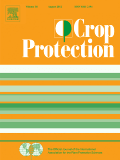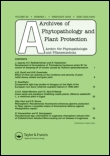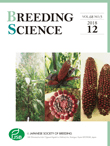
NEMATROPICA
metrics 2024
Unveiling the Role of Nematodes in Crop Health
Introduction
NEMATROPICA is a distinguished academic journal dedicated to advancing the field of nematology and its relevance to agronomy and crop science. Published by the Organization of Tropical American Nematologists, this journal serves as a crucial platform for researchers, professionals, and students to disseminate original research and reviews focused on the biology, ecology, and management of nematodes within agricultural systems. With an evolving history since its inception in 1988, NEMATROPICA has consolidated its reputation, currently holding a Q3 classification in Agronomy and Crop Science for 2023, indicating its respected standing within the field. Although the journal is not open access, its valuable contributions underscore the importance of nematodes in ecological interactions and pest management strategies, making it essential reading for those committed to enhancing agricultural productivity and sustainability. The journal's contact address is Auburn University, Department of Plant Pathology, Auburn, AL 36849, United States.
Metrics 2024
 0.24
0.24 0.60
0.60 0.50
0.50 28
28Metrics History
Rank 2024
Scopus
IF (Web Of Science)
JCI (Web Of Science)
Quartile History
Similar Journals

Tropical Plant Pathology
Fostering dialogue for a sustainable agricultural future.Tropical Plant Pathology, published by Springer, is a leading journal in the fields of Agronomy and Crop Science as well as Plant Science, as evidenced by its impressive position in the Q2 quartile rankings for 2023. This esteemed journal, with an ISSN of 1983-2052, focuses on the intricacies of plant diseases and their management, showcasing significant research that addresses challenges faced by agronomists and plant scientists, particularly in tropical environments. With a Scopus ranking of 147th in Plant Science and 116th in Agronomy and Crop Science, it is recognized for its contribution to the advancement of knowledge in these areas, which is crucial for food security and sustainable agriculture. The journal operates under a model that facilitates researchers and professionals in disseminating their work effectively, fostering an ongoing dialogue among scholars dedicated to enhancing crop health and productivity. Discover more about groundbreaking studies in plant pathology that shape the future of agriculture!

Crop Protection
Championing innovative practices in sustainable agriculture.Crop Protection is a leading academic journal in the field of Agronomy and Crop Science, published by Elsevier Science Ltd, and recognized for its high impact demonstrated by an impressive Q1 quartile ranking in 2023. With its ISSN 0261-2194 and E-ISSN 1873-6904, this esteemed publication has been a crucial source of research since its inception in 1982, continuing to provide valuable insights and advancements in crop protection strategies through 2024. The journal serves a diverse audience, including researchers, professionals, and students, eager to explore pioneering findings in pest management, herbicide development, and sustainable agricultural practices. While the journal does not offer open access options, its rigorous peer-review process ensures the highest quality of scholarly articles that contribute significantly to the agricultural and biological sciences, maintaining its respected position with a Scopus rank of #63 out of 406 in its category, placing it in the 84th percentile. Engaging with Crop Protection not only enriches knowledge but also promotes innovative solutions for global agricultural challenges.

ARCHIVES OF PHYTOPATHOLOGY AND PLANT PROTECTION
Uncovering Insights to Protect Our Crops and EnvironmentArchives of Phytopathology and Plant Protection, published by Taylor & Francis Ltd, stands as a pivotal platform in the field of agronomy and crop science since its inception in 1974. With an ISSN of 0323-5408 and E-ISSN of 1477-2906, this journal is dedicated to publishing high-quality, peer-reviewed research that addresses contemporary challenges in plant pathology and protection. As a Q3 ranked journal in its category with Scopus Rank #210/406, it serves a vital role in disseminating practical solutions and innovative discoveries to enhance agricultural productivity and sustainability. The journal fosters a rich exchange of ideas among researchers, professionals, and students, empowering them to contribute to the advancement of the agronomy and biological sciences. Despite being traditionally subscription-based, the journal's commitment to comprehensive and rigorous research makes it an essential resource for anyone invested in the future of plant health and agricultural innovation.

Legume Research
Innovating Research to Enhance Legume UtilizationLegume Research, published by the AGRICULTURAL RESEARCH COMMUNICATION CENTRE in India, is an essential peer-reviewed journal focusing on advancements in the field of agronomy, crop science, soil science, and plant science. With an ISSN of 0250-5371 and operating since 2008, this journal caters to researchers, agricultural professionals, and students interested in the critical role of legumes in sustainable agriculture and food security. It ranks within the third quartile (Q3) in several prominent categories, reflecting its contribution to the agricultural and biological sciences community—ranking #279 in Agronomy and Crop Science, #113 in Soil Science, and #376 in Plant Science based on Scopus metrics. Although not open access, Legume Research remains a vital resource for those seeking to enhance their knowledge and contribute novel research findings in the ever-evolving discipline of legume cultivation and utilization. With a clear objective to disseminate impactful research, this journal significantly contributes to the global understanding of legumes' ecological, economic, and nutritional importance.

Frontiers in Agronomy
Exploring the Future of Crop ScienceFrontiers in Agronomy, published by FRONTIERS MEDIA SA, is a premier open-access journal dedicated to the dynamic field of agronomy. Launched in 2019, it has rapidly established itself as a leader in the publication of groundbreaking research, holding a distinguished Q1 ranking in several categories including Agricultural and Biological Sciences, Agronomy and Crop Science, Plant Science, and Soil Science as of 2023. With an impressive Scopus ranking that positions it among the top journals in its field, this journal provides a valuable platform for researchers, professionals, and students alike to disseminate and access innovative research and critical insights in agronomy. Every contribution to Frontiers in Agronomy undergoes rigorous peer review, ensuring that high-quality research remains at its core. Accessible to all since its inception, it serves as a vital resource for advancing knowledge and fostering collaboration within the global agronomic community, supporting the quest for sustainable agricultural practices and enhanced crop productivity.

Agronomy-Basel
Pioneering Insights for a Greener TomorrowAgronomy-Basel is a leading international journal dedicated to advancing the field of agronomy and crop science, published by the respected MDPI. Since its inception in 2011, this open-access journal has provided a vital platform for the dissemination of high-quality research, featuring innovative studies and reviews that contribute to the understanding of agricultural practices and crop management. With an impressive impact factor and ranked in the Q1 quartile of its category for 2023, Agronomy-Basel has established itself as a premier resource in the realm of Agricultural and Biological Sciences, achieving a commendable rank of #62 out of 406 in its field, placing it in the 84th percentile. The journal targets researchers, professionals, and students who are dedicated to enhancing agricultural sustainability and productivity. Located in Basel, Switzerland, the journal's commitment to open access empowers global accessibility to flourishing agricultural advancements, thus fostering collaboration and innovation across the globe.

NEMATOLOGY
Exploring the Intricacies of NematodesNematology is a prominent journal published by BRILL, focusing exclusively on the multifaceted realm of nematodes and their ecological, agricultural, and biological implications. With an ISSN of 1388-5545, this esteemed journal serves as a vital platform for researchers, professionals, and students dedicated to advancing knowledge in Agronomy and Crop Science and Ecology, Evolution, Behavior, and Systematics. Established in 1999 and continuing its mission until 2024, Nematology holds a Q2 ranking in Agronomy and Crop Science and a Q3 ranking in Ecology as of 2023, indicating its significant impact within these fields. Published in the Netherlands, this journal is accessible through various options, providing vital insights into nematological research and its applications. Researchers from around the globe are encouraged to explore, submit manuscripts, and contribute to the evolving discourse within this specialized yet pivotal area of study.

PLANT PROTECTION SCIENCE
Pioneering solutions for sustainable plant health.PLANT PROTECTION SCIENCE, published by the Czech Academy Agricultural Sciences, is an esteemed journal dedicated to advancing the field of agronomy, crop science, and soil science. With a strong open access policy since 2007, this journal has made significant contributions to the dissemination of research relevant to plant protection, sustainable agriculture, and environmental preservation. Operating from Prague, Czech Republic, it has successfully positioned itself within the Q2 category in Agronomy and Crop Science and Q3 in Soil Science as of 2023, highlighting its relevance and influence in these vital areas of agricultural research. According to Scopus, its rankings reflect a respectable standing, with percentile ranks of 58th in Agronomy and Crop Science and 53rd in Soil Science. Researchers, professionals, and students are encouraged to explore its rich repository of peer-reviewed articles, which aim to address critical challenges in plant health and production, thereby fostering innovation in agricultural practices.

PLANTA
Connecting researchers with the essence of plant life.PLANTA, published by SPRINGER, stands as a pivotal journal in the field of plant sciences and genetics, known for its rigorous peer-reviewed research that has influenced the advancement of botanical science since its inception in 1925. With an impressive trajectory of convergence from the years 1925 to 1945, and again from 1947 to 2024, this journal maintains a strong reputation, currently categorized in the prestigious Q1 tier of Plant Science and Q2 tier in Genetics as of 2023. The journal is recognized for its high impact, ranked #64 out of 516 in Plant Science by Scopus, representing the top 87th percentile within its category, while also securing a strong position in Genetics with a #92 rank. The journal serves as a critical resource for researchers, professionals, and students who are eager to explore the complex genetics, biochemistry, and evolutionary biology of plants. Though primarily subscription-based, the quality of the research published in PLANTA makes it an essential reading for anyone serious about advancing their knowledge and understanding of plant sciences.

BREEDING SCIENCE
Driving Research for a Sustainable Agricultural FutureBREEDING SCIENCE is a premier journal published by the Japanese Society of Breeding, dedicated to the advancement of knowledge in the disciplines of agronomy, plant science, and genetics. Established in 1993, this influential publication has consistently contributed to the global research community, showcasing high-quality studies that intersect innovative breeding techniques with pressing agricultural challenges. With an esteemed Scopus rank placing it in the top quartile of Agronomy and Crop Science and the second quartile in Plant Science, BREEDING SCIENCE is essential reading for researchers, professionals, and students alike. The journal's reach and rigor are evidenced by its significant presence in leading academic databases, providing insights and advancements that are critical for improved crop production and sustainable practices. Although it does not currently offer open access options, the depth and relevance of its content ensure that it remains a vital resource for those committed to exploring the evolution and impact of breeding science. For further information, readers are encouraged to connect directly with the journal via its administrative office located at the University of Tokyo's Graduate School of Agricultural and Life Sciences.